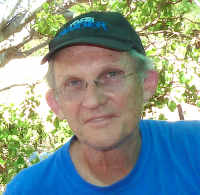Stephen Muecke

Stephen Muecke has written on Indigenous Australia and more recently on the Indian Ocean. His books include Ancient & Modern: Time, culture and Indigenous philosophy (2004).
Dancing on Walter Benjamin’s grave, in this book, Michael Taussig is in some ways his reincarnation; born in Sydney in 1940, the same year that Benjamin, trying to escape the Nazis, died in Port Bou, on the edge of the Pyrenees. The dance that Taussig performs is of course a homage to the great intellectual: the most inspired thinker coming out of the Frankfurt school, the most uncompromising, a ... (read more)
Having disposed of World War I in a couple of brief chapters, our shell-shocked soldiers wonder what to do next. During the war, sinister balloons carrying out surveillance had hovered over the trenches. This now gives Axel Glover and Edward Llewellyn an idea. They have become mates in an understated English way, never making eye contact.
‘The first time I saw Axel Glover he was standing stark ... (read more)
Is the exercise of judgment the reason for a book review? I hate the idea of that. I would rather experiment with the genre by asking if it can add something to the book, like a mole or a prosthesis. In the process, could one also say something about how the book works, as it moves through its various environments, collecting other growths? I think John Kinsella would appreciate this eco-critical ... (read more)
On the cover of Mick Taussig’s new book, video artist Juan Manuel Echavarria performs a rather clever metaphor for the disintegration of the state. A floral pottery platter with the legend Republica de Colombia para siempre (‘The Republic of Colombia for ever’) is progressively broken up until it is nothing but a pile of white powder: the state as drug cartel.
Taussig is an expatriate Sydne ... (read more)
Australia is exceptionally rich in parrots. Why? Many Australian plants have hard, woody seed capsules because of adaptation to seasonal aridity, low nutrient soils and wildfire. Parrots can be seen as flying nutcrackers. Australia does not, however, have any woodpeckers. Why? Well, read the essay.
George Seddon is well-known as an environmentalist and academic. Western Australian readers wil ... (read more)
Literary theory is in for an exciting time in Australia. While the Leavisites in the older English departments were wondering what happened to the British ‘Great Tradition’, literary studies went General and Comparative in the 1960s, establishing a fertile context for the development of genuine theoretical developments such as those brought about by the encounter with structuralism, phenomenol ... (read more)
Stephen Muecke 'Traumascapes: The power and fate of places transformed by tragedy' by Maria Tumarkin
If it is the case that we can no longer avoid the effects of living under conditions of globalisation, then increasingly that spatial dimension governs our lives. Look not, therefore, deep into the history of our individual nations or localities to explain what is going on, but lift your eyes to the horizon, and beyond, where a devastated city may be smouldering. Within minutes, a local politician ... (read more)
